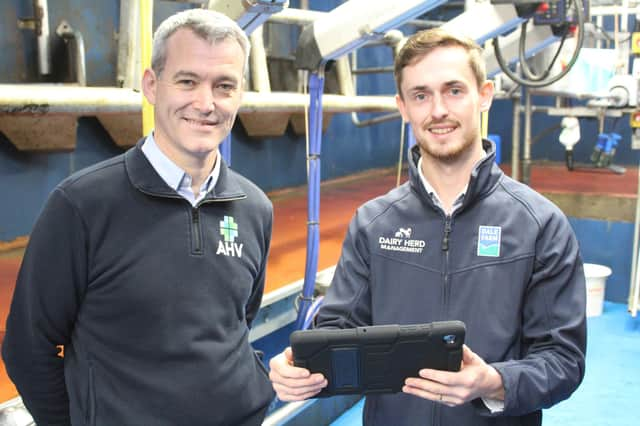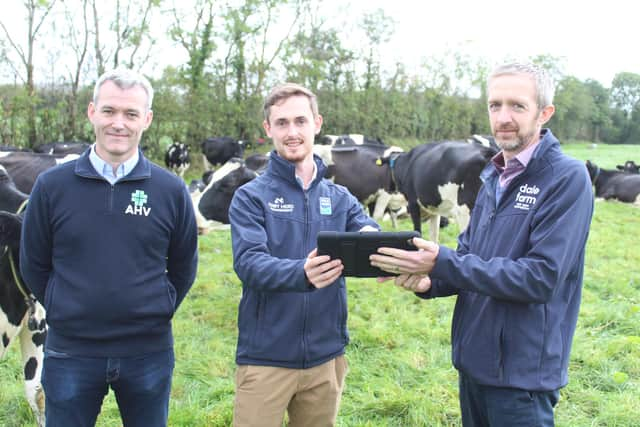New Partnership to improve Northern Irish milk quality


The collaboration, which came into effect in October, will see AHV collaborating with Dairy Herd Management to get more farmers to become data driven when it comes to their business.
AHV’s managing director Adam Robinson explained: “NI dairy farmers do a fantastic job at getting good production out of dairy cows and it is important that the farmers know which cows are profitable and which are not. Farmers also need to know which cows need attention, not only for udder health reasons but fertility and metabolic issues.
“These are the cows that can be easily identified from a milk recording and an action plan can be put in place to help support the animal, especially in early lactation. The end goal here is to improve lifetime production and longevity in dairy cows.


“Milk recording gives power back to the farmer to identify concerns and make management decisions to rectify the problems. This is more beneficial than recording monthly.”
But as Adam Robinson also pointed out, getting the data that regular milk recording offers is the first step – interpreting it and making the information count when it comes to implementing accurate herd management decisions for the future is equally important.
He added: “Providing a financial incentive to encourage more dairy farmers to milk record is always welcome, and the best incentive is having someone to call upon to help interpret the data. This can be the largest frustration of milk recording, as results can end up unopened on the kitchen or office table because some farmers need assistance in pulling out the relevant data they require.”
Offer at a glance
Adam explained: “Milk recording is very good value for money for the information you receive but is expensive if the data is not being used. For this reason, AHV are offering a service that each farmer will have a dedicated AHV consultant to help interpret the data face to face. The data can either be online or in paper form, but we do encourage online information as there is so much more data available and paperless recording comes with a monthly discount.
“This consultancy is a free service that we are making available as part of the partnership with Dairy Herd Management.
“As well as the above service, AHV will cover the milk recording fee of £30/herd/month. The offer can be used by those customers purchasing AHV products to a minimum value of £4,500 during the 12 months of the milk recording agreement. A credit of £360 will be credited to their account, once this minimum value has been met within the 12-month period. Customers must commit to 12 consecutive, monthly milk recordings.”
As part of this innovative agreement, Dairy Herd Management will also cover the costs associated with the final month of recording in the series of the 12 required to complete a full year’s data set, so in essence the farmer is getting the last month free of charge.
Adam continued: “This is why with this campaign, the farmer will get a dedicated AHV advisor who will be available to analyse the monthly milk recording figures to help clients make meaningful decisions where the future management of individual cows and complete herds are concerned.”
Why the urgency to start milk recording?
Approximately only 40 per cent of dairy farmers in Northern Ireland regularly milk record. As Dale Farm’s Producer Services Manager Gary Watson confirmed, the need to increase this figure is significant.
He said: “We provide recording services to dairy farmers across Northern Ireland, irrespective of who they supply their milk to.
“Milk recording is a fast-evolving technology, with a single milk sample providing a gateway to so much information on that particular animal that it can impact on the entire range of management decisions taken by dairy farmers.”
He added: “Traditionally, milk recording was used to secure accurate information on individual cow yields plus butterfat percentage, protein percentage and somatic cell count levels.
“Today, however, milk can be analysed to detect urea levels, to determine a pregnancy diagnosis and to confirm the presence (or otherwise) of diseases such as BVD, IBR and Johne’s.”
The milk recording information accrued by Dairy Herd Management on individual cows can also be accessed by UK breed societies. Specific calving dates, insemination dates and genomic assessments determined for individual cows can also be stored by Dairy Herd Management on behalf of farmer-clients, with access through the online portal and the ‘Mobile Herd’ App. Information of this nature is vitally important when it comes to determining future herd breeding programmes.
Gary Watson explained: “It is feasible, reliable and accurate to confirm pregnancy courtesy of a milk sample analysis from 28 days post conception using our ‘PregCheck’ test.”
Red Tractor changes pushing for milk recording
The service can also help with upcoming changes to the Red Tractor quality assurance scheme, where Johne’s Disease is concerned.
Gary said: “From November 1st dairy farmers will be expected to have completed a veterinary risk assessment for Johne’s as part of their Red Tractor inspection, so we strongly encourage farmers to be proactive in providing their vet with specific information on the Johne’s status of each milking cow in their herd.
“The most feasible way of doing this is to analyse a milk sample from each animal. The role for Dairy Herd Management’s milk recording service stands out in this context.”
According to Adam Robinson, milk recording will be at the heart of the dairy industry’s response to the challenge of antimicrobial resistance (AMR) and securing improvements in udder health.
He said: “The pressure is on to focus more on the health and longevity of our dairy cows. As a case in point, selective dry cow therapy has been identified as a cow management technique that can help the milk sector meet its obligations in this regard.
“But it only works if farmers have up-to-date milk recording information on each cow throughout her lactation within their herds.
“Milk recording four or six times a year is of limited value. Cows must be recorded monthly throughout their lactations to allow farmers to identify trends and ensure the early identification of health challenges – leading to a more proactive approach.”
Adam added: “This is why our team of AHV advisors will be available to analyse the monthly milk recording reports with farmers, so they can act fast on problems before they become real challenges.”
Data-driven dairying in Northern Ireland
Gary Watson believes the collaboration between Dale Farm and AHV has the potential to increase the quality of milk in Northern Ireland.
He said: “Dairy farmers will have no option but to improve the sustainability of their businesses as they look to the future. In practical terms, this means making better decisions that will increase the efficiency of their businesses, leading to more productive animals which can only result in better milk yields and better milk quality.
“Decision making is only as good as the information it is based upon. Milk recording ticks every box in this regard, where dairy farmers are concerned.”
Gary concluded: “Moreover, it’s a service that is equally relevant to both pedigree and commercial milk producers and all farmers should be taking advantage of it.
“Let’s move towards a proactive dairy industry – together!”
To take advantage of the offer or for more information see www.ahv.com.